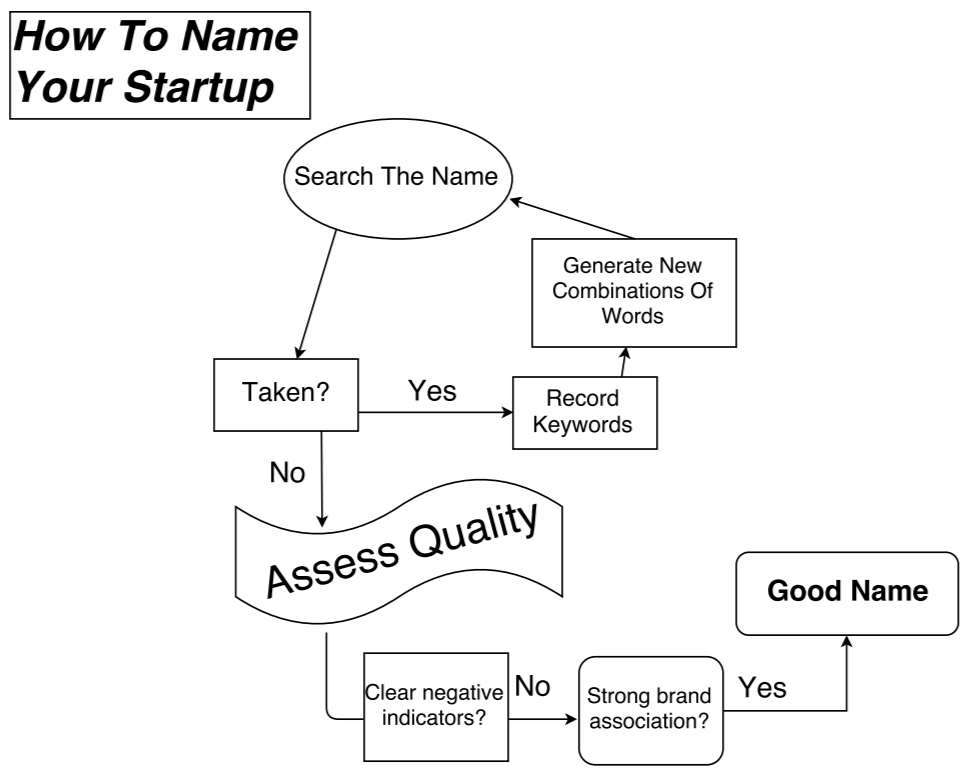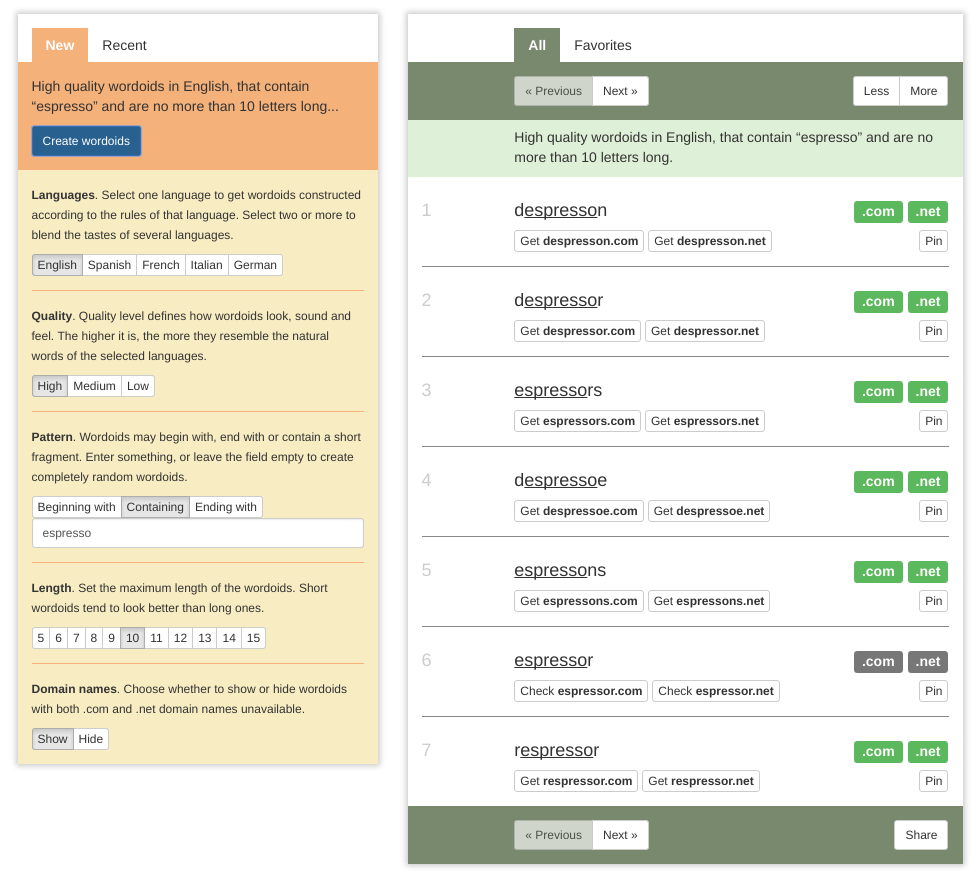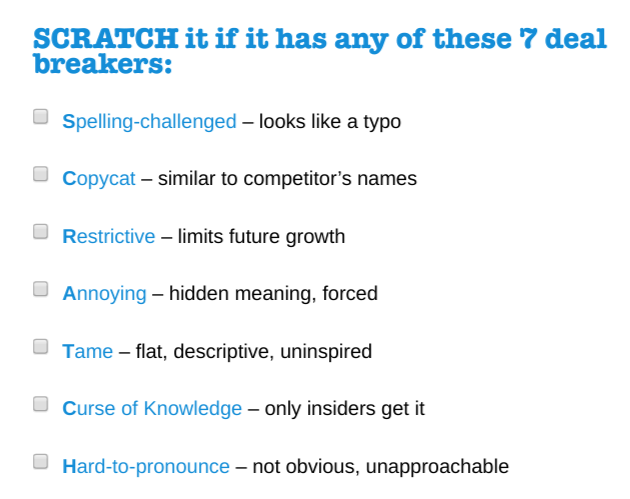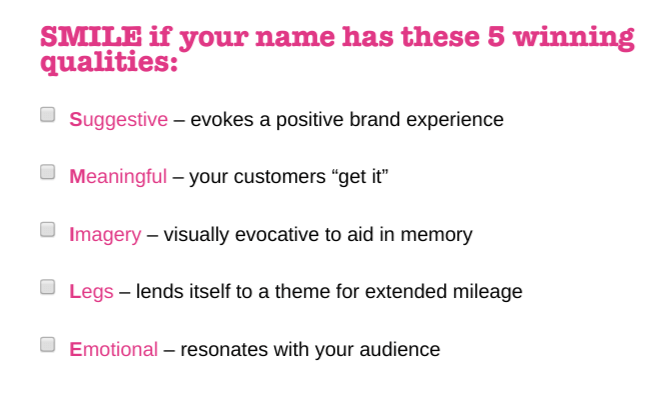
06 Jul How To Name Your Startup The Smart Way
[ad_1]
Naming your startup is one of those problems that can keep you stuck if you let it.
It can simultaneously seem inconsequential and life-or-death important, and it’s not usually solved by dedicating more labor to it. In fact, more “cooks in the kitchen” tends to just muddy the brainstorming waters and make it even harder to find a good name.
What you need isn’t effort, you say, it’s money! OurAwesomeDomain.com is up for auction, but the bidding starts at $130,000, and the owner won’t sell to us for less because he knows we’re a startup! All is lost.
All is not lost. You don’t need money or a ton of effort to find a solid name for your startup. You just need a process.

This is startup naming the smart way.
1. Search The Name
First, you need to make sure that some of the names you want are actually available as website domains. Coming up with names without checking to see if they’re available as websites is probably going to be a massive waste of time.
Some great tools for coming up with possible names:
- Namemesh: Enter a few keywords, and Namemesh will give you possible domain names of all kinds—.com, .io, various shortened versions and versions with country-codes. Each turns into a Godaddy link, which you’ll have to use to see if the domain is actually available.
- Wordoid: Wordoid is an easy-to-use tool that helps you construct brand new words out of a chosen keyword. You can specify how long you want your made-up words to be, whether you want to differentiate with another language and more.

One of the biggest debates in startup naming is over the .com suffix. Some say you need it so desperately you shouldn’t even bother going on if you don’t have it. Some say you don’t need it. A .com domain may have benefits, but the latter is closer to the truth—it’s never mattered less than it does now, and it matters less and less every day.
The Truth About .com Addresses
For years, people have urged startups away from other suffixes and insisted they concentrate on finding a .com address that works for their business. But other suffixes are here to stay. Today, there are scores of very successful companies out there with .io, .co, .net, and other suffixes. That’s in large part due to the fact that it doesn’t matter, functionally, what suffix your web address has anymore.
Seriously. When’s the last time you typed a full address into your browser, .com and all, and then hit Enter?
When people find your website, they’ll likely find it through a link on Medium or Product Hunt or Hacker News—which they will click. If they don’t bookmark your site, then they’ll get back to it by typing the first few letters of the name. Their browser’s omnibar will do the rest.
People don’t need to remember that your business has a .com address. What they need to remember is the name of your business. It’s far, far more important to have a recognizable and sticky name than it is to have a .com address.
A .com won’t hurt you, and it can lend a nice feeling of legitimacy to your brand, but don’t register “doorknob.com” if you’re building APIs. It’s not that important.
2. Record Keywords
After you’ve started looking at different domain names and have some ideas in mind, write down several keywords that come to mind when you think about your business.
You do this after looking at different domain names because sites like Namemesh and Wordoid, by actively suggesting alternatives, will be an immeasurable help in coming up with your keywords.
To do this, look at your competition. Their names probably follow some patterns. Take those patterns and use them for your own startup.
There’s a reason why so many startups go with names that are faintly derivative of other startups, and it’s called the familiarity principle. You’re asking new users to take a risk on your unknown service. They’re going to be very comforted if they can link what your startup does—even if you do it way better—to other companies in your space.
Generate New Combinations
As you figure out some keywords that you want to define your business, start entering them into your domain name generator.
While you do this, more and more alternatives will pop up and give you new ideas for keywords that you could be using. When some odd combination of words inspires you, record it somewhere so you can use it as you continue to test out different names. Look at synonyms of your keywords in the thesaurus. Look in the dictionary. Look on Wikipedia, and don’t stop looking until you’ve completely exhausted your mental energy.
If you’re building a super edgy fashion e-commerce store, maybe you’ll wind up looking at the track listings from obscure 1980’s Italian post-punk bands. If you’re building a logistics startup, maybe you’ll be delving into the complexities of differentials and getting inspired there.
Sitting around thinking and throwing ideas at the wall to see what sticks is what most people do. You want to be coming up with ideas quickly, testing to see if they’re available, tossing them if they’re not, and constantly coming up with more to try.
3. Assess Quality
Once you have some domain names that are available, step back and assess them.
Eatmywords.com offers a simple “Scratch” test that you can run on each idea you have. There are seven “deal breaker” elements. If any of these apply to your startup’s name, keep looking:

Here are some examples of names that badly fail the Scratch test:
- Zapwonco: hard-to-pronounce
- Phonecamera: tame
- CPC-MIN: curse of knowledge (cost per click minimizer)
- Andy’s API: restrictive
- Supr: spelling-challenged
Copycatting is a tricky one. If you were to start a MySpace competitor and call it MyPlace, that would make people immediately wary of your company. If you were inspired by your college’s yearly “facebook” to create a website called “Thefacebook.com,” then it would breed familiarity and make it obvious what you were all about.
Generally, if your name is “just a name,” then you’re not giving your startup and your company the credit you deserve.
Twitter was the brainchild of a team running a failing podcast company called Odeo. Not only did Odeo not give you any way into what the company might do or how they might want to make you feel, but it also had a natural resonance with “odious”—perhaps the world you least want to associate your podcast company with.
What A Good Name Looks Like
Here are the five qualities of a business with a good name according to Eatmywords:

Think of Twitter. They’re also a great success story of using the dictionary to come up with a name. Twitter (dictionary definition: “to utter a succession of small, tremulous sounds, as a bird”) sounds playful, conveys the nature of the product well, is easily memorable, and has incredible legs. You tweet, you retweet. There’s a cute bird as a logo. “Twitter” is all abuzz with activity.
The emotional part is trickier to pull off. People can only really form an emotional connection once the product is real. For Twitter, the name resonates with the anti-establishment aura that Twitter built up around itself in its early years. Twitter was the alternative social network, a tiny community banding together as giants like Facebook and Instagram took off in popularity. The Twitter bird served as an emblem of the service’s underdog nature.
Put In The Time
Dig into the Eatmywords rubric a little bit and it becomes clear that what you’re really looking for is two things: you want people to remember your name, and you want them to have a positive association with the brand it represents.
It’s easy to pick a name that accomplishes neither. It’s hard to pick a name that does one of them well, and it can be really hard and time-consuming to come up with one that does both.
It’s also important to remember that a great name isn’t going to make your business—but it will tip the odds in your favor. People are people. They want to use products and services that make them feel. The biggest and most important way you can create an emotional connection is through your startup’s name. The easiest way to find that name is with a process that lets you do so without falling victim to a creative block.
[ad_2]
Source link
Social Media Agency, Social Media, Digital Marketing, Digital Marketing Agency, Search Engine Marketing, SEO, digital marketing agency dubai, video content marketing, crossfit marketing dubai, video marketing dubai, digital marketing agency abu dhabi, facebook marketing dubai, facebook marketing abu dhabi, digital marketing agencies in dubai, social media agency, content marketing dubai, content strategy dubai, branding dubai

